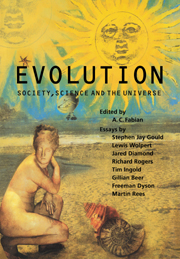Book contents
- Frontmatter
- Contents
- Introduction
- 1 On Transmuting Boyle's Law to Darwin's Revolution
- 2 The Evolution of Cellular Development
- 3 The Evolution of Guns and Germs
- 4 The Evolution of London
- 5 The Evolution of Society
- 6 The Evolution of the Novel
- 7 The Evolution of Science
- 8 The Evolution of the Universe
- Notes on Contributors
- Acknowledgements
- Index
6 - The Evolution of the Novel
Published online by Cambridge University Press: 25 January 2010
- Frontmatter
- Contents
- Introduction
- 1 On Transmuting Boyle's Law to Darwin's Revolution
- 2 The Evolution of Cellular Development
- 3 The Evolution of Guns and Germs
- 4 The Evolution of London
- 5 The Evolution of Society
- 6 The Evolution of the Novel
- 7 The Evolution of Science
- 8 The Evolution of the Universe
- Notes on Contributors
- Acknowledgements
- Index
Summary
It seemed at first paradoxical to find myself invited to write about ‘The Evolution of the Novel’ since I do not believe that the novel evolved, and have spent some work demonstrating that this is one among a number of misplacements of the evolutionary metaphor – misplacements that have caused confusion (and worse) in other areas of experience (musicology and race-relations are two). But the invitation has allowed me to discriminate between, on the one hand, the effects of this misapplied metaphor on the history of past fiction and, on the other, the creative urgency with which writers have responded to evolutionary ideas in all their contradictory implications – indeed, for their contradictory implications. What has most drawn novelists, I argue, are the tensions within and between Darwinian ideas, as well as the pressures in the relation of such ideas to the human.
Fiction thrives always at points of contradiction, and evolutionary theory offered contradictory stories and contrasting trajectories for interpretation. Was this an account of development or decay? Did development inevitably imply progress, or was this a new version of the Fall? Did evolution make room for disinterestedness or did it necessitate always a ghastly struggle for too few resources? Was it communitarian or individualistic? What made evolutionary theory so fruitful for fiction was not only its coherence but its contradictions. True, it proposed a universalizing theory that would explain the history of all kinds on the earth: descent with modification, predominantly by means of the newly described and named principle, natural selection.
- Type
- Chapter
- Information
- EvolutionSociety, Science and the Universe, pp. 100 - 117Publisher: Cambridge University PressPrint publication year: 1998

